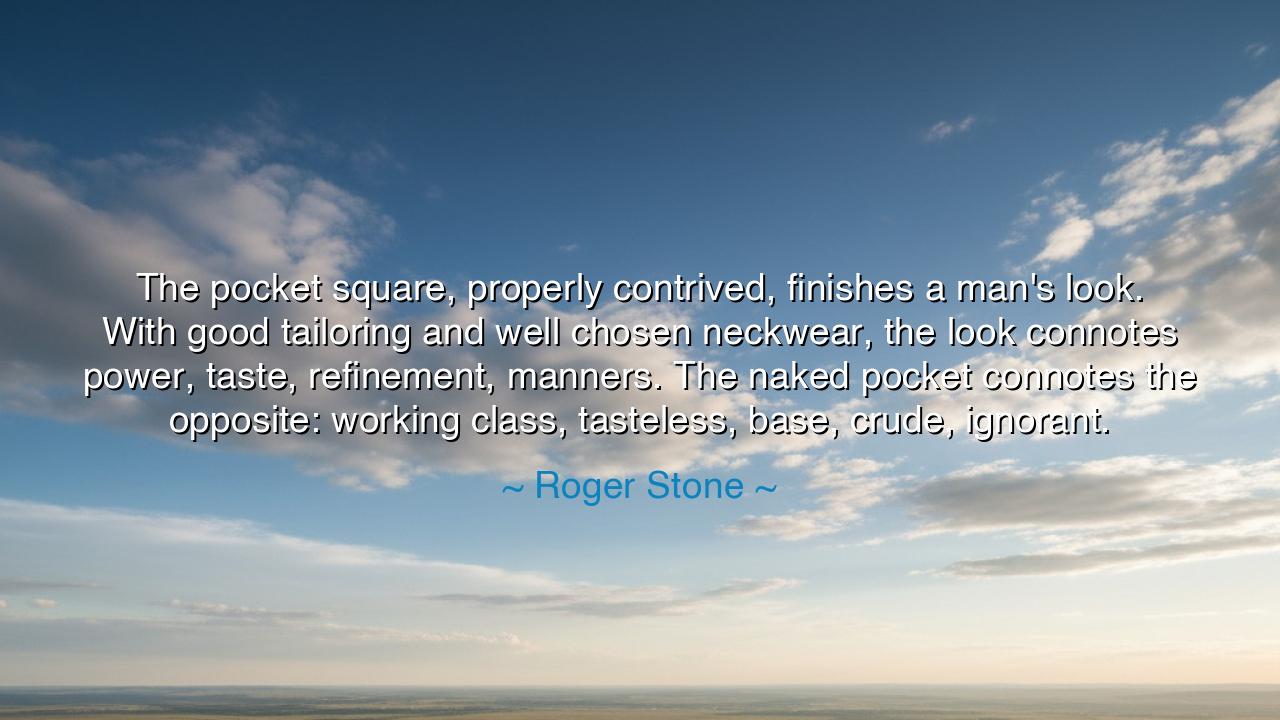
The pocket square, properly contrived, finishes a man's look.
The pocket square, properly contrived, finishes a man's look. With good tailoring and well chosen neckwear, the look connotes power, taste, refinement, manners. The naked pocket connotes the opposite: working class, tasteless, base, crude, ignorant.






In the words of Roger Stone—“The pocket square, properly contrived, finishes a man's look. With good tailoring and well chosen neckwear, the look connotes power, taste, refinement, manners. The naked pocket connotes the opposite: working class, tasteless, base, crude, ignorant.”—we hear the creed of one who sees clothing not as fabric alone, but as a weapon of power and a marker of status. The pocket square, a small piece of cloth, becomes in his vision a standard, a banner announcing refinement, authority, and mastery of the social battlefield. To neglect it, he argues, is to risk signaling weakness, ignorance, or vulgarity.
The ancients understood the symbolic might of adornment. The Romans wrapped themselves in the toga, not merely for warmth, but to display citizenship and dignity. The Greeks spoke of elegance as a virtue of the nobleman, proof of inner discipline reflected in outward form. Even the Spartans, austere in their way, wore scarlet cloaks on campaign, believing that the color struck fear in the enemy and dignity among allies. So too, Stone insists, does the pocket square transform the ordinary into the commanding.
Yet his words also reveal the sharp edge of class distinction. The naked pocket, in his judgment, represents the working class, “base” and “crude.” This reflects an ancient truth often repeated: clothing has long been a divider of ranks. In feudal Japan, only the samurai were permitted to wear two swords, a visible marker of their social authority. To step into the world without these symbols was to risk being seen as lesser. Likewise, in Stone’s world, to forgo the pocket square is to be marked as unfashioned and powerless.
History offers countless examples of such symbolism. Louis XIV of France, the Sun King, demanded that his courtiers dress with meticulous splendor, believing that control of appearance was control of power. At Versailles, lace, embroidery, and fabric were not mere clothing—they were instruments of dominance, separating the king’s glittering circle from the “ignorant” masses beyond the palace gates. The pocket square, in Stone’s analogy, is a descendant of this same tradition: a small emblem that speaks volumes about one’s station.
Thus, let us learn: the outward form often speaks before the tongue does. Whether it be the pocket square, the toga, or the samurai’s swords, symbols of refinement carry the weight of perception, and perception shapes destiny. Yet we must also remember the deeper truth: that adornment without virtue is empty, and that the noblest refinement is not of silk or linen, but of the soul. For clothing may win the eye, but only character wins the ages.






NQNguyen Nhu Quynh
This quote from Roger Stone suggests a rigid view of style that associates certain accessories with class and sophistication. But does this imply that those who don’t embrace these norms are somehow lesser? How much importance should we place on symbols of wealth and class when evaluating a person? Shouldn’t we move beyond superficial markers like pocket squares and focus more on the values and actions that define a person’s true character?
MZmr zero
While Roger Stone’s perspective on fashion is certainly based on tradition, I question whether these fashion norms should be a basis for judging someone's character. Can the choice of a pocket square really determine if someone is ‘refined’ or ‘tasteful’? Isn't this kind of judgment based on appearances dangerous? Doesn’t it oversimplify the complexities of individual identity and dismiss other qualities that truly matter?
QNDO THI QUYNH NHU
Roger Stone’s focus on the pocket square as a symbol of power and refinement makes me wonder: should fashion really be used to create divisions between classes? Can a well-dressed individual truly be considered ‘refined’ while others are dismissed for not adhering to the same standards? Shouldn’t we challenge this idea that appearance automatically equates to intelligence or worth? What happens if people can’t afford to conform to these standards?
ALAnh Luong
Stone’s view on the pocket square seems to emphasize the importance of appearances, but it raises a bigger question about the role of fashion in defining social class. Does dressing a certain way truly indicate one’s worth or intelligence, or does it simply reinforce stereotypes? How much should we really tie someone’s value to the clothes they wear? Shouldn’t personality and actions matter more than the accessories we choose?
LTChiem Ly Thi
Roger Stone’s take on fashion and style is interesting but also somewhat limiting. Does wearing a pocket square really reflect one’s power or sophistication? Can we judge someone’s taste or manners based on such small, superficial details? While tailoring and accessories can certainly contribute to an impression, can we truly reduce a person’s character to the accessories they wear? Does this approach miss the broader picture of individual identity and expression?